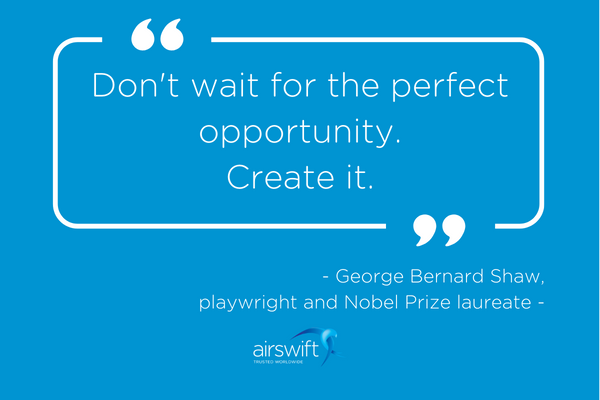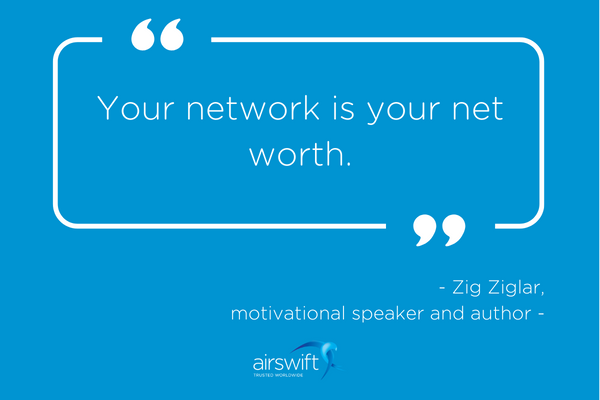
By
Diyaa Mani
February 22, 2024
Updated
February 22, 2024
Ready to move beyond your current achievements and chart your ascent into leadership territory? This guide reveals the not-so-secret tactics to getting promoted, unearthing hidden pathways and propelling you towards your professional goals.
Here is a list of steps you should take to progress towards the next stage of your career:
- Define your trajectory with a career development plan
- Develop powerful networking strategies for accelerated career growth
- Build a compelling case for senior advancement
- Demonstrate key competencies for senior success
- Ace the interview and negotiate like a pro
- Master your career advancement pathway with Airswift
Define your trajectory with a career development plan
A strategic career plan is essential for guiding you towards achieving your career advancement goals. It's about figuring out the rules of getting ahead in your company, spotting job opportunities ahead of time, and making sure your skills shine in the right places.
Strategic career mapping towards promotion
Getting a promotion doesn't have to feel like cracking a secret code. Get to know the informal rules within your organisation. Learn how promotions typically occur, what skills are valued, and the specific requirements for your target position. Don't leave your future to chance – learn how your company's promotion system works and tailor your journey accordingly.
Analysing company growth plans and identifying potential openings is important if you are preparing to ascend the career ladder. Match your career goals with the company's direction. Look into their future plans, pinpoint new areas or teams that are forming, and keep an eye out for upcoming job openings that suit your skills. Think ahead and position yourself as the perfect fit for the company's upcoming needs.
Finding out how others in your department or similar positions have progressed can also give you clues. Study their career moves, understand the common career paths to advancement, and borrow the tactics that worked for them. No need to start from scratch - use the successful strategies of those who've already made it as a guide for your own career journey.
Skill alignment for successful advancement
Knowing where you're going is crucial, but having the right tools is equally important. This is where skill alignment comes in.
Conduct a skills audit for yourself. Figure out what you're great at and where you could improve. Pinpoint your key skills, both technical and soft ones like how well you communicate or lead a team. Be honest in your self-review and consider areas where you might need to upskill or reskill. Knowing yourself well sets the stage for targeted skills development and a more impactful career pathway.
Next, polish your resume and portfolio. Highlight your relevant skills for the target positions and showcase your achievements and value proposition. Don't simply list accomplishments – tell your story in a way that shows off your impact and how you're ready to do even more.
Seeking a mentor can be a game-changer. Find guidance from individuals who've achieved similar promotions. A mentor's wisdom and insights on climbing the career ladder can make your journey smoother and shorter.
Flip the script and mentor others, too. Sharing your know-how, nurturing new leaders, and contributing to your industry's future not only feels good but also cements your role as a senior leader. It's a way to pay forward the help you've received and make a lasting mark.
Finally, never stop learning and expanding your skillset. Attend workshops, conferences, or online courses to stay updated on industry trends and acquire new knowledge. Continuous growth keeps you at the forefront of your field and opens doors to greater opportunities.

Develop powerful networking strategies for accelerated career growth
Your network is your net worth. Building genuine connections can open doors to unexpected opportunities and accelerate career growth.
Find the key players within your organisation who have the power to influence promotion decisions. Build relationships with them through formal channels like meetings or conferences and informal settings like networking events and coffee chats.
Keep your network vibrant and growing. Dive into industry gatherings, reach out to peers across departments, and keep the lines open with past colleagues and mentors. Think of your network as a living, breathing part of your career. Tending to it can open doors to opportunities and resources you might not find on your own.
Play an active role in your networking efforts. Share what you know by giving talks, joining volunteer efforts, or writing about your field. Make your voice heard and establish yourself as a thought leader within your industry and professional community.
Remember, networking shouldn't feel forced. Focus on building authentic connections with colleagues and mentors. Show interest in their work, offer help where you can, and celebrate their successes. Genuine relationships create a supportive ecosystem that fosters mutual growth and success.
How senior professionals can leverage existing networks
Senior professionals can unlock new opportunities and insights by actively engaging with their diverse network, including colleagues from different departments, past roles, and even dormant contacts like former mentors. This approach can reveal overlooked prospects and strengthen support networks, creating opportunities for collaboration that boost industry reputation for everyone involved.
Tapping into alumni networks and employee groups, offers rich industry knowledge and partnership opportunities. Move past surface-level interactions, by organising meaningful meetings and providing personalised support.
Leveraging technology, like LinkedIn or niche platforms, is key to efficiently keeping these connections alive and well-organised. Hosting or participating in virtual events, such as workshops or webinars, is an excellent way to nurture your professional community, ensuring you stay connected and relevant in your network.
Strategic networking: Why personal branding matters for senior professionals
For senior professionals, strategic networking transcends mere contact collection. It's about leveraging connections and solidifying a personal brand to accelerate career growth. A robust personal brand is your professional signature, distinguishing your unique value in a competitive industry.
LinkedIn: Your launchpad for thought leadership and visibility
LinkedIn has become the go-to platform for professional networking and establishing thought leadership. Maximise its potential by crafting a compelling profile that showcases your expertise. Write a tailored headline, summarise your achievements using relevant keywords to ensure discoverability, and don't underestimate the power of a professional headshot.
Supplement this by publishing articles, participating in discussions, and forging impactful connections. Join industry groups, share your expertise, and become a recognised resource. This comprehensive approach enhances visibility and positions you as an indispensable leader, paving the way for internal promotion and career advancement.
Beyond LinkedIn: Expanding your professional network
LinkedIn is a great tool, but don't forget the power of engaging in industry events, conferences, and workshops to meet peers and potential partners. Push yourself to speak at these events and in-house training sessions to boost your brand and network. Writing articles or guest posts for well-regarded industry publications also showcases your knowledge to a broader audience, cementing your status as a thought leader. Additionally, forming strategic partnerships with complementary businesses or professionals can unlock new opportunities and amplify your success.
Here is a list of key takeaways for personal branding success:
- Define your unique value proposition, niche expertise, and key message.
- Stand out by being authentic and maintaining a consistent voice across all platforms.
- Share your journey and passions to connect deeply with your audience.
- Celebrate others' successes to foster a positive and collaborative presence.
- Use networking and personal branding strategically to become a thought leader and accelerate career growth.

Build a compelling case for career advancement
With your strategic roadmap in place, it's time to build a case for your advancement. You will secure the promotion you deserve by weaving a persuasive personal manifesto that speaks to both numbers and leadership.
Quantify your impact within the organisation
Don't just rely on vague achievements. Gather concrete data and metrics and use these to showcase your contributions. Quantify the financial impact of your projects and highlight cost savings, revenue increases, or efficiency improvements. Turn your actions into tangible results that speak volumes about your potential for future success.
Unleash your leadership skills: Leveraging innovation and adaptability for senior success
While mastering leadership skills remains crucial for promotions, senior professionals today face another challenge: demonstrating their ability to drive innovation and thrive in an ever-evolving business landscape. Don't wait for leadership opportunities to fall into your lap – create them and showcase your ability to guide and inspire others.
Cultivating a culture of growth through innovation
Leadership in today's dynamic business landscape transcends mere direction. It demands nurturing a culture where innovation thrives. Lead by example by actively encouraging experimentation, calculated risk-taking, and open communication within your team.
Don't hesitate to challenge the status quo. Question established processes and propose alternative solutions backed by data and analysis, showcasing your critical thinking and ability to identify areas for improvement.
Setbacks offer valuable learning opportunities. Embrace failure as a springboard for growth, encouraging your team to learn from mistakes and iterate on their ideas, fostering a culture of continuous improvement. Stay ahead by actively tracking industry trends, emerging technologies, and competitor initiatives. Share your insights with your team and encourage them to explore how these external forces could impact your organisation.
Adaptability: Your secret weapon for thriving in change
While leadership fosters innovation, adaptability ensures its implementation. Go beyond mere claims – highlight concrete examples of successful change management. Did you lead your team through a merger, restructuring, or major technological shift? Share how you navigated these challenges, communicated effectively, and ensured a smooth transition.
Demonstrate your learning agility by showcasing your ability to acquire new skills and apply them to new situations quickly. Have you mastered new technologies or methodologies relevant to your industry? Emphasise your willingness to embrace ongoing learning and development.
Diverse perspectives fuel innovation. Embrace and value different viewpoints when tackling challenges. Showcase your ability to collaborate effectively with individuals from various backgrounds and experiences.
Finally, don't just identify problems; be a problem solver. Propose solutions and demonstrate your ability to think strategically and implement effective change.
Demonstrating key competencies for senior success
Senior professionals today must showcase a broader range of competencies to stand out. These go beyond simply managing teams and include:
Vision and strategic thinking
Effective leaders paint a compelling picture of the future for their team and the organisation. Can you craft a clear, inspiring vision aligned with the company's goals? Demonstrate this by spearheading successful initiatives that improve efficiency or drive positive change.
Integrity and trustworthiness
Trust forms the bedrock of any successful team. Senior leaders must lead by example, consistently demonstrating ethical behaviour and upholding their commitments. Showcase your integrity by resolving conflicts fairly and transparently, earning respect and trust of your colleagues.
Effective communication
Communication is a two-way street. Effective leaders actively listen to their team, clearly articulate their ideas, and adapt their communication style to different audiences. Showcase your communication skills by delivering persuasive presentations that secure buy-in for new projects, engaging your audience and fostering understanding.
Delegation and collaboration
Building a high-performing team requires both empowerment and collaboration. Effective leaders delegate tasks strategically, playing to individual strengths, and foster a culture of collaboration where everyone feels ownership. Demonstrate your expertise by delegating responsibilities effectively and celebrating successes together, building a cohesive and motivated team.
Problem-solving and decision-making
Inevitably, challenges arise. Senior leaders must analyse situations strategically, develop creative solutions, and make informed decisions under pressure. Showcase your problem-solving skills by navigating project setbacks effectively, minimising impact and keeping your team on track.
By cultivating these key competencies, senior professionals go beyond leadership to demonstrate their strategic thinking and ability to build trust, communicate effectively, collaborate seamlessly, and solve problems creatively. This broader skillset positions them as valuable assets and paves the way for well-deserved career advancement.
.png?width=584&height=826&name=Career%20advancement%20graphics%20(1).png)
Ace the interview and negotiate like a pro
You've been putting in the work, and it's paid off. The culmination of your hard work and strategic career moves finally arrives. You're now on the shortlist for that dream promotion you've been eyeing. By mastering the art of interviewing and wielding the power of negotiation, you can transform yourself from a contender to a standout candidate.
Negotiating beyond the offer
Craft a negotiation strategy that considers your worth and long-term career goals. Negotiating isn't just about the initial offer; it's about securing your future. Advocate for yourself confidently, and don't be afraid to counter-propose. While you deserve to be compensated fairly, the negotiation goes beyond salary and benefits. This is your chance to shape your role and future within the organisation. Consider negotiating:
Responsibilities and scope
Discuss opportunities to expand your responsibilities beyond the traditional scope of the position, aligning them with your skills and career aspirations. This could involve leading new projects, mentoring junior team members, or taking on broader strategic initiatives.
Influence and decision-making
Seek greater involvement in key decision-making processes, demonstrating your confidence and expertise. Negotiate for a seat at relevant leadership meetings or committees, allowing you to contribute valuable insights and shape the organisation's direction.
Professional development and growth
Secure resources and opportunities for ongoing learning and development. Negotiate for access to training programs, conferences, or mentorships that will equip you with the skills and knowledge needed to excel in your new role and advance your career.
By strategically negotiating compensation, roles, responsibilities, and influence, you showcase your vision for the future and your commitment to the organisation's success. This demonstrates proactiveness and ambition that will set you apart as a truly exceptional candidate.
Master your career advancement pathway with Airswift
Mastering the path to your dream promotion requires a strategic approach, self-reflection, and continuous learning. With dedication, perseverance, and the right strategies, you can conquer the path to professional fulfilment and achieve your career goals.
Fuel your career advancement with our expertise:
- Unmatched reach: With 60 global offices in many different regions, you can find the perfect fit, no matter your location or ambition.
- Exceptional firms: We partner with top-tier companies across industries, such as energy, technology and more, ensuring you land with the best.
- Expertise in your corner: Our dedicated local team guides and supports you every step of the way, from resume polishing to interview prep.
Are you a professional ready to advance your career? Visit our candidate career portal to explore the latest job openings across the engineering and technology sectors.
